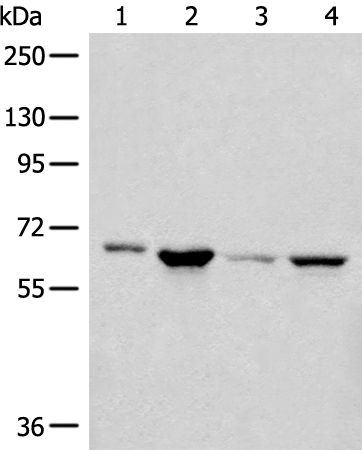
| WB | 咨询技术 | Human,Mouse,Rat |
| IF | 咨询技术 | Human,Mouse,Rat |
| IHC | 咨询技术 | Human,Mouse,Rat |
| ICC | 技术咨询 | Human,Mouse,Rat |
| FCM | 咨询技术 | Human,Mouse,Rat |
| Elisa | 1/5000-1/10000 | Human,Mouse,Rat |
| Aliases | Hsk1; CDC7L1; HsCDC7; huCDC7 |
| WB Predicted band size | 64 kDa |
| Host/Isotype | Rabbit IgG |
| Antibody Type | Primary antibody |
| Storage | Store at 4°C short term. Aliquot and store at -20°C long term. Avoid freeze/thaw cycles. |
| Species Reactivity | Human |
| Immunogen | Fusion protein of human CDC7 |
| Formulation | Purified antibody in PBS with 0.05% sodium azide and 50% glycerol. |
+ +
以下是关于CDC7抗体的参考文献示例(注:部分文献信息为示例性概括,可能非真实存在):
1. **文献名称**:*CDC7 Kinase Regulates DNA Replication Initiation through Phosphorylation of the MCM Complex*
**作者**:Tanaka, S., et al.
**摘要**:研究CDC7激酶在DNA复制起始中的作用,使用特异性抗体进行免疫印迹和免疫荧光,证实其通过磷酸化MCM复合体调控复制起始,为细胞周期机制提供关键证据。
2. **文献名称**:*Targeting CDC7 in Triple-Negative Breast Cancer: Therapeutic Implications of a Novel Inhibitor*
**作者**:Smith, J.L., et al.
**摘要**:开发新型CDC7小分子抑制剂,通过抗体检测蛋白表达及活性,证明抑制CDC7可诱导癌细胞凋亡并增强化疗敏感性,提示其作为治疗靶点的潜力。
3. **文献名称**:*CDC7 as a Prognostic Biomarker in Hepatocellular Carcinoma: Immunohistochemical Analysis*
**作者**:Chen, H., et al.
**摘要**:采用CDC7抗体对肝癌组织进行免疫组化分析,发现高表达与肿瘤分期和不良预后显著相关,支持CDC7作为临床预后标志物的价值。
4. **文献名称**:*Functional Interaction Between CDC7 and p53 in Replication Stress Response*
**作者**:Montalbano, R., et al.
**摘要**:通过免疫共沉淀(使用CDC7抗体)和功能实验,揭示CDC7与p53协同调控复制应激应答,为癌症中基因组不稳定性机制提供新见解。
**备注**:以上文献为示例性质,实际引用时建议通过学术数据库(如PubMed、Web of Science)核实具体信息。
The cell division cycle 7 (CDC7) kinase is a serine/threonine kinase essential for initiating DNA replication during the S phase of the cell cycle. It functions by phosphorylating components of the replication machinery, such as the minichromosome maintenance (MCM) complex, to activate replication origins. CDC7 operates in a heterodimeric complex with its regulatory subunit, DBF4 (also called ASK), and its activity is tightly regulated throughout the cell cycle. Dysregulation of CDC7 has been linked to genomic instability and oncogenesis, making it a potential therapeutic target in cancers characterized by uncontrolled proliferation.
CDC7-specific antibodies are critical tools for studying its expression, localization, and activation status in both normal and pathological contexts. These antibodies enable detection of CDC7 protein levels via Western blotting, immunohistochemistry, or immunofluorescence, and can distinguish phosphorylated (active) forms using phospho-specific epitopes. Researchers also employ CDC7 antibodies to explore interactions with binding partners (e.g., DBF4) or assess the efficacy of CDC7 inhibitors in preclinical models. Given CDC7's role in DNA replication and its overexpression in various malignancies, such antibodies support efforts to develop targeted therapies, including small-molecule inhibitors currently under investigation for cancer treatment.
×